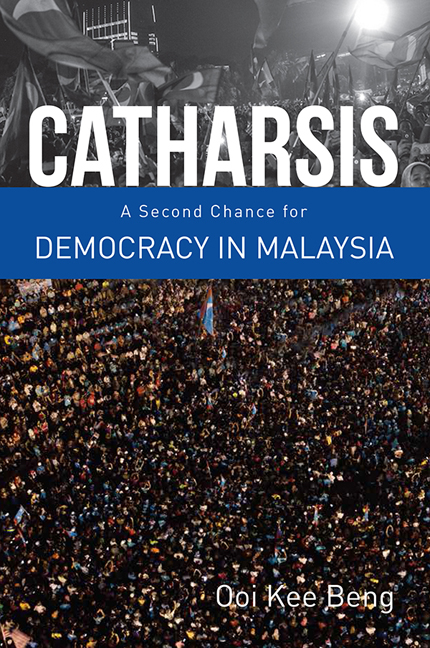Book contents
- Frontmatter
- Contents
- Foreword
- 1 Introduction – Malaysia's Future Is Redeemed
- Before Pakatan Harapan
- Before 9 May 2018
- 12 Racialising the Un-racialisable: What Is the Red Shirt Rally All About?
- 13 One Country's Merdeka Is Another's Damage Control
- 14 Malaysia – Where Politics Must Be Ethnically Inclusive and Exclusive at the Same Time
- 15 Is Malaysia at a Crossroads or in a Quagmire?
- 16 Unity Without Solidarity Sows Disunity
- 17 UMNO and Looking Back at History
- 18 Sarawak Forces Federal Opposition to Do Deep Soul-searching. But Can It?
- 19 By-elections Reveal New Malay Politics
- 20 Interview with Mahathir Mohamad: ‘People Must Be Able to Hold Their Heads Up.’
- 21 Malaysia Has to Start Re-examining Its Histories
- 22 Waves from US Probe into 1MDB May Turn into Tsunami
- 23 Seeking a New Formula to Unite Malaysia's Diversity
- 24 Time for Anwar to Accept Mahathir's Olive Branch?
- 25 Najib, Mahathir and the Timing of Malaysia's Polls
- 26 Excessive Governance Is Not Good Governance
- 27 Why Malaysia's Opposition Will Take to the Streets Again
- 28 Merdeka is About The Individual, Too
- 29 A Battle Between Malay Leaders Over Malaysia's Future
- 30 The Primacy of Political Economy in Asia
- With Mahathir at the Helm
- Beyond 9 May 2018
- About the Author
20 - Interview with Mahathir Mohamad: ‘People Must Be Able to Hold Their Heads Up.’
from Before 9 May 2018
Published online by Cambridge University Press: 12 February 2019
- Frontmatter
- Contents
- Foreword
- 1 Introduction – Malaysia's Future Is Redeemed
- Before Pakatan Harapan
- Before 9 May 2018
- 12 Racialising the Un-racialisable: What Is the Red Shirt Rally All About?
- 13 One Country's Merdeka Is Another's Damage Control
- 14 Malaysia – Where Politics Must Be Ethnically Inclusive and Exclusive at the Same Time
- 15 Is Malaysia at a Crossroads or in a Quagmire?
- 16 Unity Without Solidarity Sows Disunity
- 17 UMNO and Looking Back at History
- 18 Sarawak Forces Federal Opposition to Do Deep Soul-searching. But Can It?
- 19 By-elections Reveal New Malay Politics
- 20 Interview with Mahathir Mohamad: ‘People Must Be Able to Hold Their Heads Up.’
- 21 Malaysia Has to Start Re-examining Its Histories
- 22 Waves from US Probe into 1MDB May Turn into Tsunami
- 23 Seeking a New Formula to Unite Malaysia's Diversity
- 24 Time for Anwar to Accept Mahathir's Olive Branch?
- 25 Najib, Mahathir and the Timing of Malaysia's Polls
- 26 Excessive Governance Is Not Good Governance
- 27 Why Malaysia's Opposition Will Take to the Streets Again
- 28 Merdeka is About The Individual, Too
- 29 A Battle Between Malay Leaders Over Malaysia's Future
- 30 The Primacy of Political Economy in Asia
- With Mahathir at the Helm
- Beyond 9 May 2018
- About the Author
Summary
Tun Dr Mahathir Mohamad was in Penang as part of his cross-country tour, and as a guest of Penang Institute, to gather at least one million signatures for the Citizen's Declaration he initiated. He spent 20 minutes talking with Ooi Kee Beng in between arriving from KL with Tun Dr Siti Hasmah and rushing off to deliver his speech at the packed Straits Quay Convention Centre. The interview took place in the late afternoon on 8 May 2016 at the E&O Hotel.
Dr Ooi Kee Beng: Tun, your generation fascinates me. You are of the nation-building generation who dared to imagine that it would not only change the world, but configure it to fit local conditions. The impact of that generation has of course been enormous in all post-colonial countries but that generation is passing. What advice would you give young Malaysians about the future, given what you see now of global economic dynamics and the political situation in Malaysia today?
Tun Dr Mahathir Mohamad: The first thing for people to learn is the history of the country because if you don't have an understanding of the background of the country, you cannot make an assessment of events or of the improvements that have taken place. Many Malaysians today were born long after Independence. I would tell them that what we are seeing today is completely different from what we had under the British or even in the early days of Independence. So we must be able to make a comparison between the past and the present.
OKB: If there is one word to describe you, Tun, I would use the word ‘nationalist’. You are very much, for want of a better word, a situationalist. Your analysis of events and different times shifts as things evolve; you seem very tuned into evolving dynamics. In that sense the methods you adopt would be understood best in a tactical mode. Would that be correct?
MM: I was trained as a doctor and a doctor approaches a problem with a certain method. He has to know the background, the history of the patient and do an additional examination to see what the problem is. For a sick person or for a community, it is the same thing. Once you adopt that approach, you recognise a problem much more clearly.
- Type
- Chapter
- Information
- CatharsisA Second Chance for Democracy in Malaysia, pp. 68 - 74Publisher: ISEAS–Yusof Ishak InstitutePrint publication year: 2018

